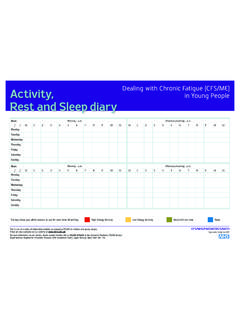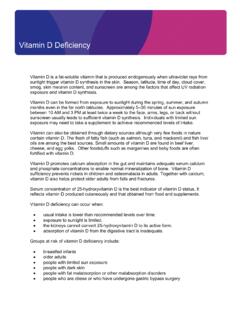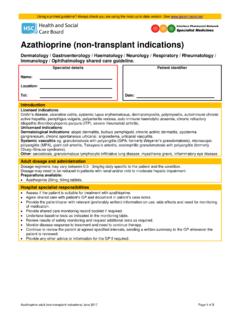Transcription of hydroxychloroquine gp guidelines 2008
1 Upper Borough Walls Bath. BA1 1RL Telephone: 01225 465941 Facsimile: 01225 421202 dmard monitoring guidelines for gp information hydroxychloroquine A. Indications: (Licensed) RA, connective tissue diseases (systemic and discoid lupus) and some photosensitive dermatological conditions B. Dose: Grade of evidence: C Typical regime: 200 400 mg daily. Dosage may be reduced to 200 mg daily depending on clinical response. Maximum dose: Should not exceed mg/kg body weight per day. C. Route of administration: Oral D. Caution: Grade of evidence: C (1) Patients with renal and liver impairment. (2) Patients with epilepsy: may reduce threshold for convulsions.
2 (3) Avoid antacids within 4 h of dose. (4) May exacerbate psoriasis. E. Contraindications: Grade of evidence: C (1) Breast feeding (see section G).* (2) Pre-existing maculopathy. F. Notable drug interactions (refer to BNF and SPC) (1) Digoxin: Concomitant administration may cause an increase in plasma concentration of digoxin. (2) Methotrexate: Concomitant administration may increase plasma concentration of methotrexate although methotrexate and hydroxychloroquine are often used in combination. (3) Ciclosporin: Concomitant administration may increase plasma concentration of ciclosporin. (4) Known hypersensitivity to 4-aminoquinoline compounds.
3 (5) Avoid use with amiodorone, moxifloxacin and quinine. (6) Avoid concomitant use of mefloquine. G. Pregnancy and breast feeding: Category of evidence: B (1) hydroxychloroquine has been used relatively safely in pregnancy. The risks of stopping treatment should be weighed against the small possible risk to the unborn child. (2) Breast feeding is contraindicated.* *Local guidelines currently in development hydroxychloroquine Consultant: .. Telephone.









